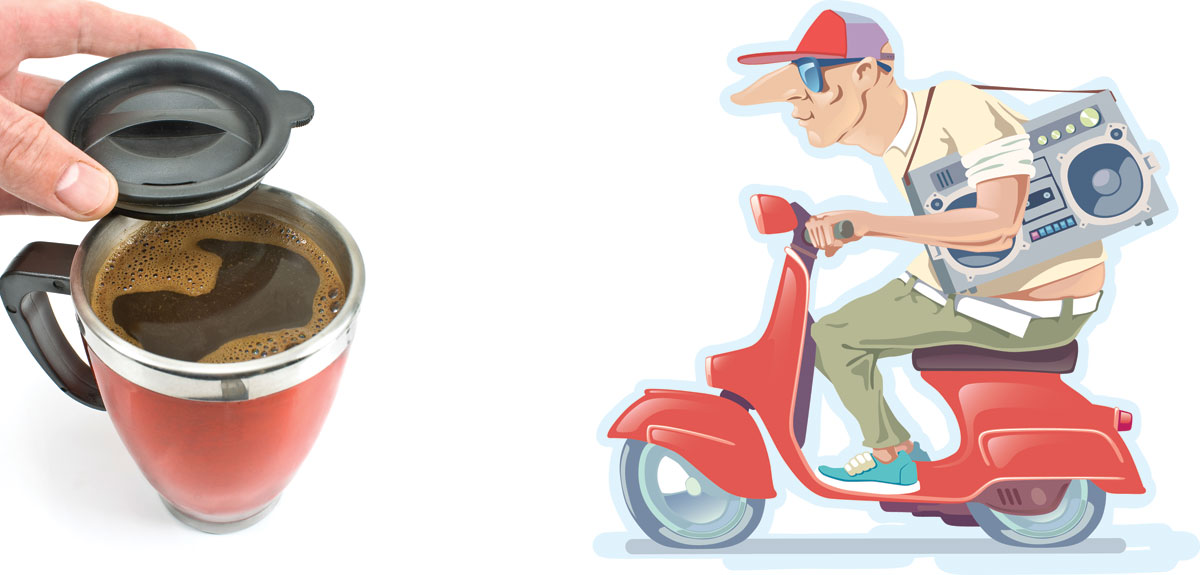UNBREAKABLE FLASK
I don’t know how my family members in India suspected that I planned to visit them, but I received several letters from my brother and sisters.
A tiny request, Raghav, can you bring a walkie-talkie. It does not weigh much, love you,” wrote my sister Pramila.
“Bring a two-in-one, I will pay the cost including the customs fee immediately,” wrote my elder brother Ram. He knows I won’t take money from him.
“Don’t forget your little sister. Bring me Chanel No. 5 perfume, two bottles, and a Japanese sari,” Shamu, my teen sister scribbled at the bottom of Ramu’s letter.
Father wanted a few double-edged shaving blades. Mother hinted that she could use a nine-yard sari.
I was rotating in the emergency room as a resident and it was hard to get off in those days.
One day my boss, Dr. Quigley reluctantly let me leave early from work and immediately I drove to Chicago’s Devon Avenue. Anybody who planned to visit India must have the darhsan of Devon Avenue AKA, little India. This was a ritual and had to be fulfilled.
Bharat Electronics, 110-220 Specialists, was right in the middle of a pukka Indian enclave. They carried electronics, which worked on 220 volts, suitcases, toys, perfumes, pans, pressure cookers, Ray Ban glasses and a thousand other items. As usual, the store teemed with Indians. A potpourri of colorful saris, salwar kameez, turbans and exotic perfumes.
Ramesh Bhai, the owner, smiled showing his golden upper front teeth. “Namaste, Aavo, come in, doctor Saab. No see for a long time.”
“That’s true, Ramesh Bhai. It’s hard to get off from work, especially from the emergency room.” I smiled.
“Visiting India? We have a lot of new things.” Ramesh enthusiastically waved his hand towards the electronic goods that lay haphazardly on the shelves. “What can I show you, Dr. Saab?”
“I need a two-in-one.” Two-in-one was a radio with a built in tape-recorder. It was a much sought after item in the seventies.
Ramesh Bhai picked up a box, opened it and brought out a two-in-one and handed it to me. “This is the best you can get in the market.”
“I will take your word for it. How much is it?”
Ramesh Bhai didn’t reply. He was focusing on someone entering the store and his attention was fully directed towards the person with a turban.
“Satsriakal, satsriakal. Come in Pyara Singhji, no see for a long time,” he greeted the new customer.
That was how Ramesh conducted his business. He started genuinely helping a customer for a minute or two. Then he left him or her in the middle of a purchase, and attended to someone else.
From there he hopped to help another, while the others waited and toyed with the appliances they were left with.
This reminded me of a barber named Venkiah in my village in India where I grew up. Venkiah started trimming my hair. Sometimes the karanam, the village chief, or the sub-inspector walked in for a haircut. Immediately, Venkiah stopped trimming my hair and attended to the needs of the village VIPs. Embarrassed, I sat there, like a half feather-plucked chicken, biting my nails, and wishing that all the VIPs should become bald immediately.
I was so engrossed in my thoughts about the similarities between Venkiah and Ramesh Bhai that I was startled when Ramesh spoke.
“Sorry, Doctor Saab, to leave you and go,” he apologized. “Do you know the gentleman at the other end? He was the secretary to the finance minister in Gujarat.” Having imparted that piece of information, he pointed to the two-in-one, and said “Can I pack it for you? Anything else? We have rice cookers. And blenders.”
“Ramesh Bhai, I have to go. How much is this?”
“Fifty dollars.”
“Pricy.”
“Doctor, it’s not a phony, it’s a Sony. Accha, for you, 40 dollars.”
“Fine, what if it does not work in India?”
“Bring it back, Saab. I will give you a new one.”
“What will I do with it, which works only on 220 volts?”
“Doctor Saab, lots of people go to India. Send it with someone. If not, I will give you a 220 to 110 volt converter, and you can use it here.”
With that piece of advice and a golden smile, he packed the two-in-one. I also bought two nine-yard saris for my mother, a Parker pen and Gillette shaving blades for my father, and perfumes.
Ramesh Bhai was happy and threw in a gas stove-lighter free. “Your mataji will love it.”
I was ready to leave but Ramesh stopped me.
“I almost forgot, doctor Saab, we have this stainless steel thermos flask. Brand new from Japan.” He picked up one from the shelf. “It is made strong and keeps coffee hot for eight hours. It’s unbreakable. You can drop it on the floor and test it.”
“I believe you. But, I don’t need it.”
“This is for your pitaji, doctor. He can enjoy hot coffee for eight hours. Mataji will be happy because she need not brew coffee that often. Moreover, the flask will last for ages.”
Ramesh Bhai had a point. I asked him to pack the unbreakable flask as well.
Everyone was happy to see me in Bangalore and liked the things I brought for them. Mother kept the flask on the top shelf in the kitchen.
After a fortnight, I returned to my job at the ER.
Several days later I booked a call to mother. After the usual preliminaries I asked her how useful the flask was and whether father was happy to have hot coffee whenever he pleased.
“Raghav, you know what happened; the flask fell down from the shelf when I tried to grab it.”
“Did it break?”
“No. Two tiles in the kitchen and the plastic lid of the flask broke.”
“So, the flask is a waste.”
“Not at all. It’s sturdy, so we use it as a hammer to drive nails in the wall or to break a coconut.”


